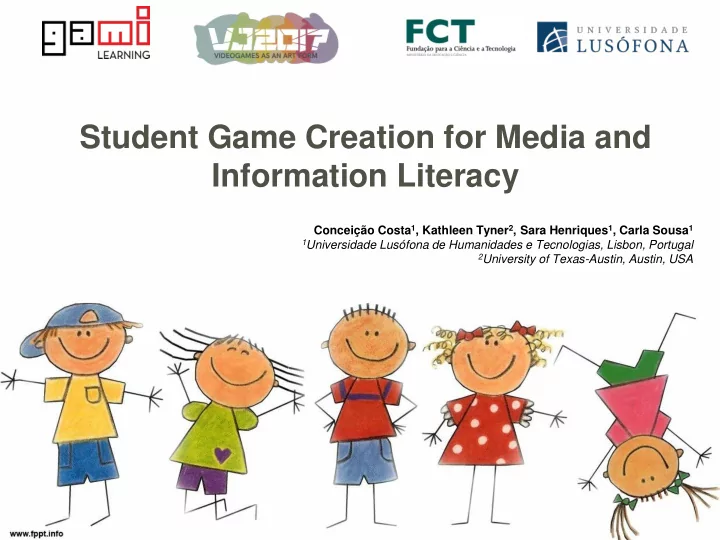

Student Game Creation for Media and Information Literacy Conceição Costa 1 , Kathleen Tyner 2 , Sara Henriques 1 , Carla Sousa 1 1 Universidade Lusófona de Humanidades e Tecnologias, Lisbon, Portugal 2 University of Texas-Austin, Austin, USA
“Promoting MIL for child and adult population is of growing importance in a context of digital media convergence and highly complex media and information ecology” (Livingstone, Bulger, Zaborowski, 2013)
Gamilearning Project (UTAP-ICDT/IVC-ESCT/0020/2014) Videogame creation as… Reflexive tool to promote Form of Media and Information Expression Literacy Empowerment Digital Security Digital Identity
Project -Aims to develop critical and participative dimensions of media and information literacy (MIL) for tweens via the creation and development of games in formal educational contexts; -Process of game creation as a reflexive process that promote the acquisition of media and information literay (MIL); -Addresses multiple literacies - media and information literacy, information literacy, visual literacy, multimodal literacy, and computer literacy/ICT literacy. Main goal: -Explores the potential of of game creation activities for children in grades 5 to 7 to foster MIL skills and knowledge. Study Goal: To explore the effectiveness of a digital game creation project-based approach for the development of MIL skills, in a formal schooling context
Research Design Four schools: ages 9-14, grades 5-7 - School 1 (CV) Lisbon: Innovation, arts education, emphasis on sports activities and digital literacies; - School 2 (RC) Lisbon : Promotion of excellence, humanized pedagogy, aware and concerned citizens - School 3 (PN) Lisbon : public school, educational territory of priority, area in need of urgent, cultural diversity. - School 4 (COV) Austin : public middle school, cultural diversity, high number of hispanic and white students, 65% of students are considered ‘economically disadvantaged’. 22 sessions/ 33h 26 sessions/ 20h 29 sessions/ 22 h 12 sessions/ 21h
Sample Characterization Age Gender Male Female Total Sample M = 10,68 41 19 (N = 58) SD = 1,384 School 1 M = 9,70 10 10 (N = 20) SD = 0,470 School 2 M = 10,00 6 0 (N = 6) SD = 0,000 School 3 M = 10,26 12 7 (N = 19) SD = 0,653 School 4 M = 12,80 13 2 (N = 15) SD = 0,775
MIL Conceptual Model • Core MIL Skills – Operational skills (including coding and computing) – Editorial skills (including multimedia writing-reading-producing and mixing) – Organisational skills (including navigating, sorting, filtering, evaluating) (Frau-Meigs, 2014) • Sociocultural componente of MIL skills (Livingstone et al., 2013) • Digital identity management components (Costa, Sousa, Rogado & Henriques, 2017)
MIL Measurement Operational Skills Organizational Skills Skills Editorial Skills Digital Identity Management Questionnaire Critical Media Literacy Knowledge Learning Social Interaction
Pedagogical approach and curricula Curriculum Content Duration in Duration in School 4 Portuguese Schools Managing Online Identities (e-presence) 4h30m 5h00m Online Security 3h00m 6h00m Internet 4h30m 0h00m Online Collaborative Platforms (SAPO 4h30m 1h00m Campus or Google First) Scratch 7h00m 4h00m Game Design and Mechanics Review and 3h30m 2h00m Critique Online security, Privacy, Begining Internet, data protection, Scratch - Animation and games coding Hackers/Crackers, Sapo Campus - Online Social Network Cyberbullying, Digital identities Games remix Coding, programming, Digital footprint Final game creation Encryption, ceaser cypher, Avatars games Online presence
Algorithmic thinking – Robot programming
Online identity - avatars
Hackers/ Crackers
Animation – create a story and animate it From paper to digital
Games remix
Results Pre M Pre SD Post Post p M SD Part I MIL Total (all items considered) 3,08 0,789 3,38 0,739 .004 Operational Skills 2,38 0,831 2,76 0,854 .017 Organizational Skills 3,29 0,942 3,52 0,861 .157 Editorial Skills 2,94 0,857 3,19 0,984 .052 Digital Identity Management Skills 3,36 1,036 3,70 0,873 .007 Part II Critical Media Literacy 3,51 1,067 3,79 0,87 .049 Learning 3,00 1,051 3,35 0,917 .012 Social Interaction 3,26 1,066 3,58 0,969 .015
Conclusion & Future Work Results indicate promising links between digital game creation and MIL development. Future work - Preliminary results from MIL questionnaire need to be integrated with the analysis of the qualitative data gathered from classes’ observation and content analysis of the final products created by children. Join us in Lisbon in 19 of April 2018 for Play2Learn Conference: http://play2learn.ulusofona.pt/
carla.patricia.sousa@ulusofona.pt http://gamilearning.ulusofona.pt
Recommend
More recommend